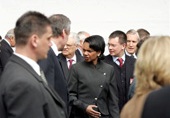Belarus to be another proving ground for a color revolution
 The prospects for future cooperation between NATO and Russia doesn't seem so optimistic as portrayed in official statements on the results of the talks.
The prospects for future cooperation between NATO and Russia doesn't seem so optimistic as portrayed in official statements on the results of the talks.
The meetings of the NATO foreign ministers took place in Vilnius, Lithuania, on Thursday. The foreign ministers of Russia and Ukraine, the two countries that are not NATO's members, also took part in the meetings. As a matter of fact, the future relationship between NATO and the above countries held the spotlight.

The prospects for future cooperation between the alliance and Russia are not so optimistic as portrayed in official statements on the results of the talks. It is true that Russian Foreign Minister Sergei Lavrov signed the NATO Partnership of Peace Status of Forces Agreement that creates legal environment for the stay of NATO's troops in Russia, and vice versa. The document facilitates greater practical military-to-military cooperation regarding transportation of troops to conflict areas and logistics of joint military exercises.
On the other hand, Russia and NATO are still in disagreement on a number of issues. Moscow again expressed its discontent with regard to the expansion of NATO to Eastern Europe. In his turn, the NATO Secretary General Jaap de Hoop Scheffer said that Russia should remove its military bases from Georgia as soon as possible. He believes that Russia should comply with the international agreements and shut down its military bases in Georgia for the benefit of peace process in the region. Russian Foreign Minister said that only Russia and Georgia should settle issues relating to the future of Russian military bases in Georgia. The two sides have been holding continuous talks on the issues, added Sergei Lavrov.
Undoubtedly, Ukraine became a dominant issue at the meetings. Ukraine stated clearly that it intended to accelerate its integration into NATO. Ukraine's brand-new allies, e.g. the Baltic states, are ready and willing to play along. Last week Lithuanian Foreign Minister Antanas Valionis said that during the Vilnius meetings NATO and Ukraine would agree on a plan to kick off the process of integration. The NATO Headquarters was quick to correct the minister's comments by saying that the agreement was really in works but no invitation to Ukraine was in the post. However, at the NATO Ministerial Meetings in Vilnius the alliance extended an invitation to Ukraine to begin an intensified dialogue on membership issues. Ukraine made a commitment to take part in Active Efforts, the NATO antiterrorist operations in the Mediterranean. The alliance is planning to help Ukraine carry out its military reform.
Kiev believes that the invitation was a starting point of the process of integration. Brussels took a more cautious stance on issues relating to Ukraine's membership in NATO. Jaap de Hoop Scheffer described the Ukrainian road to NATO as "long and winding." As for the integration of Ukraine into Euro-Atlantic structures and the European Union, Victor Yushchenko has full support of the Bush administration. Washington does not conceal its disappointment over the current attitude of European bureaucrats to both issues. U.S. government is apparently going to build a much shorter and less windy road for Ukraine.
During the Vilnius meetings, U.S. Secretary of State Condoleezza Rice was more interested in Belarus than Ukraine. "Belarus is the last dictatorship in Europe and the time has come for changes in Belarus too," as she put it after holding talks with the Lithuanian president. She met with the members of the Belorusian opposition who are likely to be a driving force behind regime change in "the last dictatorship in Europe."
So Belarus is definitely a hand-picked candidate for the next "color revolution."
On the photo: Condoleezza Rice (AP)
Subscribe to Pravda.Ru Telegram channel, Facebook, RSS!


